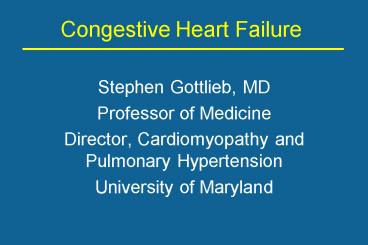Congestive Heart Failure - PowerPoint PPT Presentation
1 / 21
Title:
Congestive Heart Failure
Description:
Congestive Heart Failure. Stephen Gottlieb, MD ... Congestive Heart Failure? Ejection Fraction. NYHA (New York Heart ... Congestive Heart Failure. is a ... – PowerPoint PPT presentation
Number of Views:309
Avg rating:3.0/5.0
Title: Congestive Heart Failure
1
Congestive Heart Failure
- Stephen Gottlieb, MD
- Professor of Medicine
- Director, Cardiomyopathy and Pulmonary
Hypertension - University of Maryland
2
What is Congestive Heart Failure?
- ? Ejection Fraction
- ? NYHA (New York Heart Association Class)
- ? Cardiac Index
- ? Pulmonary Capillary Wedge Pressure
- Cardiopulmonary exercise test (CPEX)
- BNP
- ? None of the above
X
3
Congestive Heart Failure is a Clinical Diagnosis!
- Called heart failure, chronic heart failure, CHF,
HF - It is not equivalent to cardiomyopathy
- Often defined as inability to maintain adequate
cardiac output (CO) at normal filling pressures,
either at rest, with exercise or both - resulting
in symptoms and / or signs. - All of the previous factors help the clinician
decide if the patient has CHF
4
Causes of Heart Failure
- Ischemic heart disease
- Myocardial infarction
- Ischemic heart disease
- Non-ischemic cardiomyopathy
- Alcohol
- Hypertension
- Thyroid disease
- Amyloid
- HIV
- Myocarditis
- Idiopathic
- Diastolic dysfunction
- Normal ejection fraction heart failure
5
Symptoms
- Shortness of breath (dyspnea)
- Fatigue, Weakness
- Orthopnea (dyspnea lying flat)
- Paroxysmal nocturnal dyspnea (episodes of waking
from sleep by dyspnea) - Cough, chest discomfort
6
Signs
- Pulmonary
- Rales, CXR abnormalities (may disappear with
chronicity) - Fluid overload
- Edema, hepatomegaly, ascites, increased jugular
venous distention
7
Diagnosis
- Clinical
- Does the patient have typical symptoms?
- Shortness of breath with exertion
- Orthopnea, PND
- Fluid overload
- Known cardiac disease
- Is it cardiac or pulmonary
- If cardiac, what is the cause?
8
Dilated CardiomyopathyDiverse etiologies,
Common pathology
?
9
Ejection Fraction
- What is it?
- The of blood coming out of the heart with each
beat - Advantages
- Objective
- Tells if there has been myocardial damage
- Prognostic
- Disadvantages
- Doesnt reflect physiology
- Doesnt tell you about physical limitations of
patient
10
No Systolic (Diastolic?) Dysfunction
- Normal cardiac function
- Elderly
- Hypertension
- Infiltrative (Restrictive Cardiomyopathy)
- Amyloid
- Hemachromatosis
- Hypertrophic (HCM)
- With Obstruction HOCM
11
NYHA (New York Heart Association Class)
- What is it?
- A subjective indication of physical status
- I - no limitations
- II dyspnea on moderate exertion
- III dyspnea on minimal exertion
- IV dyspnea at rest
- Stages
- A - Risk for CHF B LF dysfunction without
symptoms C- Symptoms of CHF D Advanced CHF - Advantages
- Assesses physical limitation
- Disadvantages
- Subjective
- Affected by depression, deconditioning,
psychological status
12
Predictors of Depression (BDI)
From Gottlieb et al, HF-ACTION data, 2008
13
Hemodynamics
Cardiac Index (CI)Pulmonary capillary wedge
pressure (PCWP)
- What is it?
- A catheter measures cardiac function
- Advantages
- Objective, shows cardiac function
- Disadvantages
- Poorly related to symptoms
- A one time measurement
- PCWP reflects fluid status
14
Cardiopulmonary Exercise Test (CPEX)
- What is it?
- Can measure work-load, peak oxygen consumption
- Advantages
- Objectively measures functional status
- Disadvantages
- Affected by deconditioning
- Affected by lung disease
15
BNP
- What is it?
- Blood test of peptide released by heart when
distended
16
We Know BNP Levels Higher in Patients with
Cardiogenic Dyspnea
N139 N14 N97
Maisel, A. et al. JACC, 2001 37
17
We Know BNP and NT-proBNP is Prognostic in CHF
Below Median
Above Median
From Richards et al. J Am Coll Cardiol 20064752
18
BNP
- Advantages
- Objective
- Reflects cardiac pressure
- Disadvantages
- Can change with fluid status
- Affected by Obesity, Intensive Care, Renal
Disease, Chronicity of CHF, Pulmonary disease, Age
19
Conclusion
20
Conclusions
- Heart failure is common, the cause of many
hospitalizations (the most for Medicare) and
disability - There are many different types of heart failure
with many causes - It can be very difficult to determine if someone
has heart failure - Our tests all tell different information
21
(No Transcript)































